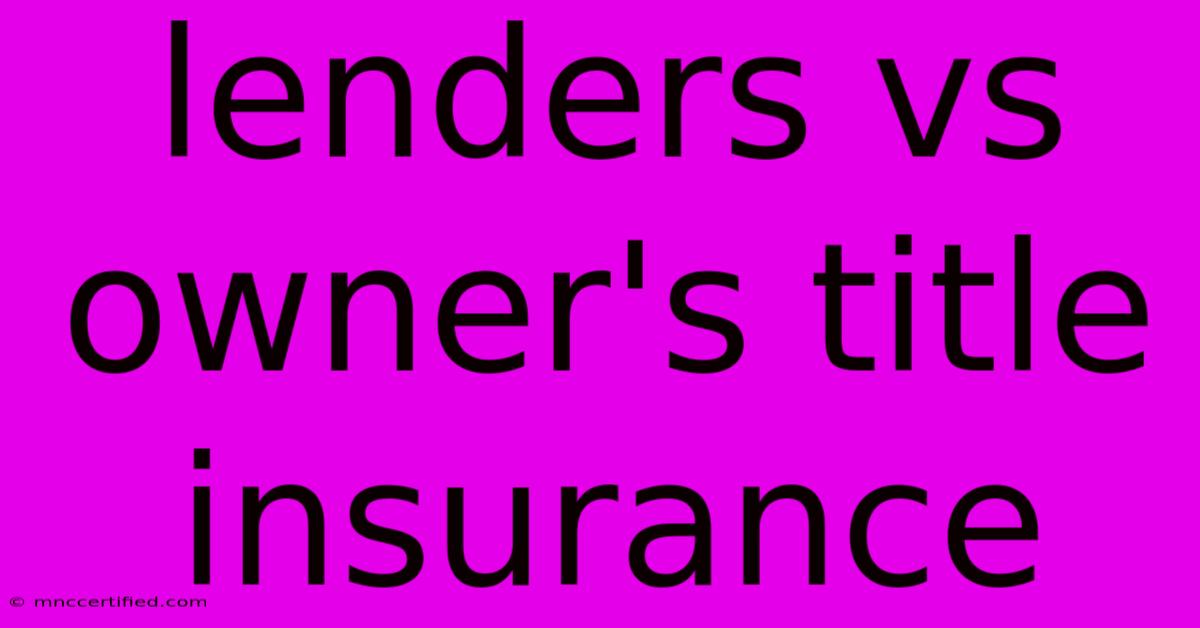Lenders Vs Owner's Title Insurance

Table of Contents
Lenders vs. Owners Title Insurance: What's the Difference?
Buying a home is a significant investment, and protecting that investment is paramount. Title insurance plays a crucial role in this process, but understanding the nuances between lender's title insurance and owner's title insurance is key to making informed decisions. This article will break down the differences, clarifying which policy you need and why.
What is Title Insurance?
Before diving into the specifics, let's define what title insurance is. Simply put, title insurance protects you against financial losses caused by defects in the ownership chain of a property. These defects can include things like:
- Forged documents: A previous owner's signature might be forged, invalidating the sale.
- Unpaid taxes or liens: Outstanding debts against the property could jeopardize your ownership.
- Boundary disputes: Issues regarding property lines can lead to costly legal battles.
- Errors in public records: Mistakes in official documents can create ownership conflicts.
Title insurance acts as a safety net, covering you against these unforeseen problems. However, there are two distinct types of policies: lender's title insurance and owner's title insurance.
Lender's Title Insurance: Protecting the Lender
Lender's title insurance primarily protects the lender (the bank or mortgage company) against financial loss if problems arise with the property's title. It ensures the lender's investment is secure. Here's what you need to know:
- Who pays for it? Typically, the buyer pays for the lender's title insurance at closing.
- Who is it for? The policy benefits the lender, not the homeowner.
- What does it cover? It covers issues that could affect the lender's ability to recover the loan amount if the title is defective.
- One-time payment: This is a one-time premium paid at closing.
- It expires when the mortgage is paid off. Once you pay off your mortgage, the lender's policy becomes void.
Owner's Title Insurance: Protecting Your Investment
Owner's title insurance protects the homeowner against financial loss due to title defects. This is a far more critical policy for the long-term security of your investment.
- Who pays for it? The buyer typically pays for this policy at closing.
- Who is it for? The policy protects the homeowner.
- What does it cover? It covers a broad range of title defects, protecting the homeowner's equity in the property. This protection lasts as long as you own the property.
- One-time payment: Like lender's insurance, this is a one-time fee paid at closing.
- Lifetime coverage: This is a crucial difference – the policy lasts as long as you or your heirs own the property.
Why is Owner's Title Insurance Essential?
Unlike lender's title insurance, which ends when the mortgage is paid, owner's title insurance provides lifelong protection. This means that if a title problem surfaces years after you've purchased the home, you're still covered. This long-term protection is invaluable, considering the significant investment a home represents.
Choosing the Right Title Insurance: A Summary
While both policies are essential in different ways, owner's title insurance is arguably more important for the homeowner’s long-term financial security. While the lender is protected by their own policy, the homeowner needs the ongoing protection of the owner’s policy against unforeseen title issues that might not arise until many years into their ownership. The relatively small one-time cost of owner's title insurance provides peace of mind and invaluable protection for your biggest investment.
Before closing on your next property, be sure to carefully review and understand the details of both policies to make an informed decision that best protects your financial interests. Consult with your real estate attorney or a title insurance professional if you have any questions.
Keywords: Lender's title insurance, owner's title insurance, title insurance, home buying, real estate, mortgage, title defects, property ownership, protect investment, closing costs, home purchase, title search, real estate attorney, title insurance company.

Thank you for visiting our website wich cover about Lenders Vs Owner's Title Insurance. We hope the information provided has been useful to you. Feel free to contact us if you have any questions or need further assistance. See you next time and dont miss to bookmark.
Featured Posts
-
Forest County Potawatomi Insurance
Nov 16, 2024
-
Uefa Nations League Portugal Match Livestream
Nov 16, 2024
-
Scotland Vs Croatia Nations League Live
Nov 16, 2024
-
Sylvester Stallone Endorses Donald Trump
Nov 16, 2024
-
Jazz Beat Mavericks Collins Game Winning Dunk
Nov 16, 2024